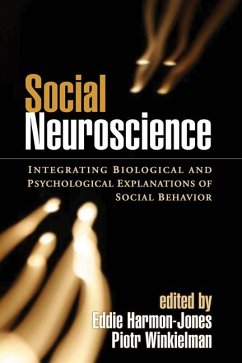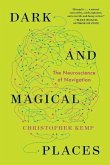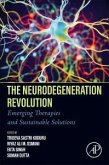Social Neuroscience
Integrating Biological and Psychological Explanations of Social Behavior
Herausgeber: Harmon-Jones, Eddie; Winkielman, Piotr
Social Neuroscience
Integrating Biological and Psychological Explanations of Social Behavior
Herausgeber: Harmon-Jones, Eddie; Winkielman, Piotr
- Broschiertes Buch
- Merkliste
- Auf die Merkliste
- Bewerten Bewerten
- Teilen
- Produkt teilen
- Produkterinnerung
- Produkterinnerung
This compelling volume provides a broad and accessible overview of the emerging field of social neuroscience. Showcasing an array of cutting-edge research programs, leading investigators present new approaches to the study of how the brain influences social behavior, and vice versa. The contributors discuss the theoretical advantages of taking a social neuroscience perspective and analyze what their findings reveal about core social psychological phenomena. Essential topics include emotion, motivation, attitudes, person perception, stereotyping and prejudice, and interpersonal relationships.
Andere Kunden interessierten sich auch für
![Everything in Its Place Everything in Its Place]() Oliver SacksEverything in Its Place15,99 €
Oliver SacksEverything in Its Place15,99 €![Dark and Magical Places Dark and Magical Places]() Christopher KempDark and Magical Places23,99 €
Christopher KempDark and Magical Places23,99 €![The Neurodegeneration Revolution The Neurodegeneration Revolution]() The Neurodegeneration Revolution143,99 €
The Neurodegeneration Revolution143,99 €![The Hidden Spring The Hidden Spring]() Mark SolmsThe Hidden Spring15,99 €
Mark SolmsThe Hidden Spring15,99 €![Sentience Sentience]() Nicholas HumphreySentience20,99 €
Nicholas HumphreySentience20,99 €![Livewired Livewired]() David EaglemanLivewired15,99 €
David EaglemanLivewired15,99 €![A Sense of Self A Sense of Self]() Veronica O'KeaneA Sense of Self15,99 €
Veronica O'KeaneA Sense of Self15,99 €-
-
-
This compelling volume provides a broad and accessible overview of the emerging field of social neuroscience. Showcasing an array of cutting-edge research programs, leading investigators present new approaches to the study of how the brain influences social behavior, and vice versa. The contributors discuss the theoretical advantages of taking a social neuroscience perspective and analyze what their findings reveal about core social psychological phenomena. Essential topics include emotion, motivation, attitudes, person perception, stereotyping and prejudice, and interpersonal relationships.
Hinweis: Dieser Artikel kann nur an eine deutsche Lieferadresse ausgeliefert werden.
Hinweis: Dieser Artikel kann nur an eine deutsche Lieferadresse ausgeliefert werden.
Produktdetails
- Produktdetails
- Verlag: Guilford Publications
- Seitenzahl: 512
- Erscheinungstermin: 1. November 2007
- Englisch
- Abmessung: 226mm x 155mm x 23mm
- Gewicht: 699g
- ISBN-13: 9781593856441
- ISBN-10: 159385644X
- Artikelnr.: 23110956
- Herstellerkennzeichnung
- Libri GmbH
- Europaallee 1
- 36244 Bad Hersfeld
- gpsr@libri.de
- Verlag: Guilford Publications
- Seitenzahl: 512
- Erscheinungstermin: 1. November 2007
- Englisch
- Abmessung: 226mm x 155mm x 23mm
- Gewicht: 699g
- ISBN-13: 9781593856441
- ISBN-10: 159385644X
- Artikelnr.: 23110956
- Herstellerkennzeichnung
- Libri GmbH
- Europaallee 1
- 36244 Bad Hersfeld
- gpsr@libri.de
Eddie Harmon-Jones, PhD, is an Associate Professor of Psychology at Texas A&M University. Dr. Harmon-Jones's current research focuses on emotions and motivations, their implications for social processes and behaviors, and their underlying neural circuits. His research has been supported by the National Institute of Mental Health, the National Science Foundation, and the Fetzer Institute. In 1999 he coedited Cognitive Dissonance: Progress on a Pivotal Theory in Social Psychology. In 2002 he received the Distinguished Award for an Early Career Contribution to Psychophysiology from the Society for Psychophysiological Research. In 2003 Dr. Harmon-Jones coedited a special issue devoted to social neuroscience for the Journal of Personality and Social Psychology. He has also served as an associate editor of the Journal of Personality and Social Psychology and is on the editorial boards of four other journals. Piotr Winkielman, PhD, is an Associate Professor of Psychology at the University of California, San Diego. Dr. Winkielman's current research focuses on the relation between emotion, cognition, body, and consciousness using psychological and psychophysiological approaches. His research has been supported by the National Science Foundation and the National Alliance for Autism Research. He has served on the editorial boards of the Journal of Personality and Social Psychology and Personality and Social Psychology Bulletin, and is currently Associate Editor of Emotion. In 2005 Dr. Winkielman coedited Emotion and Consciousness.
I. Introduction
1. A Brief Overview of Social Neuroscience, Eddie Harmon-Jones and Piotr
Winkielman
II. Emotion Processes
2. The Importance of EmotionâEUR"Social Cognition Interactions for Social
Functioning: Insights from Orbitofrontal Cortex, Jennifer S. Beer
3. Neurobiology of Emotion Recognition: Current Evidence for Shared
Substrates, Andrea S. Heberlein and Ralph Adolphs
4. Ten Years of Research with the Trier Social Stress TestâEUR"Revisited,
Brigitte M. Kudielka, Dirk H. Hellhammer, and Clemens Kirschbaum
5. I Know How You Feel: Social and Emotional Information Processing in the
Brain, Catherine J. Norris and John T. Cacioppo
6. How Thinking Controls Feeling: A Social Cognitive Neuroscience Approach,
Kevin N. Ochsner
III. Motivation Processes
7. Asymmetrical Frontal Cortical Activity, Affective Valence, and
Motivational Direction, Eddie Harmon-Jones
8. Reward: Neural Circuitry for Social Valuation, Brian Knutson and G.
Elliott Wimmer
9. A Biobehavioral Model of Implicit Power Motivation Arousal, Reward, and
Frustration, Oliver C. Schultheiss
10. Vigilant and Avoidant Responses to Angry Facial Expressions: Dominance
and Submission Motives, Jack van Honk and Dennis J. L. G. Schutter
IV. Attitudes and Social Cognition
11. Attitudes and Evaluation: Toward a Component Process Framework,
William A. Cunningham and Marcia K. Johnson
12. A Social Cognitive Neuroscience Model of Human Empathy, Jean Decety
13.How Dynamics of Thinking Create Affective and Cognitive Feelings:
Psychology and Neuroscience of the Connection between Fluency, Liking, and
Memory, Tedra A. Fazendeiro, Troy Chenier, and Piotr Winkielman
14. The X- and C-Systems: The Neural Basis of Automatic and Controlled
Social Cognition, Matthew D. Lieberman
15. An Evolutionary Perspective on Domain Specificity in Social
Intelligence, Valerie E. Stone
V. Person Perception, Stereotyping, and Prejudice
16. Mechanisms for the Regulation of Intergroup Responses: Insights from a
Social Neuroscience Approach, David M. Amodio, Patricia G. Devine, and
Eddie Harmon-Jones
17. Social Cognitive Neuroscience of Person Perception: A Selective Review
Focused on the Event-Related Brain Potential, Bruce D. Bartholow and
Cheryl L. Dickter
18. Social Neuroscience and Social Perception: New Perspectives on
Categorization, Prejudice, and Stereotyping, Tiffany A. Ito, Eve
Willadsen-Jensen, and Joshua Correll
VI. Interpersonal Relationships
19. Neuropeptides and the Protective Effects of Social Bonds, C. Sue Carter
20. The Quiet Revolution of Existential Neuroscience, Marco Iacoboni
21. Affiliative Responses to Stress: A Social Neuroscience Model, Shelley
E. Taylor and Gian C. Gonzaga
22. The Social Neuroscience of Relationships: An Examination of
Health-Relevant Pathways, Bert N. Uchino, Julianne Holt-Lunstad, Darcy Uno,
Rebecca Campo, and Maija Reblin
1. A Brief Overview of Social Neuroscience, Eddie Harmon-Jones and Piotr
Winkielman
II. Emotion Processes
2. The Importance of EmotionâEUR"Social Cognition Interactions for Social
Functioning: Insights from Orbitofrontal Cortex, Jennifer S. Beer
3. Neurobiology of Emotion Recognition: Current Evidence for Shared
Substrates, Andrea S. Heberlein and Ralph Adolphs
4. Ten Years of Research with the Trier Social Stress TestâEUR"Revisited,
Brigitte M. Kudielka, Dirk H. Hellhammer, and Clemens Kirschbaum
5. I Know How You Feel: Social and Emotional Information Processing in the
Brain, Catherine J. Norris and John T. Cacioppo
6. How Thinking Controls Feeling: A Social Cognitive Neuroscience Approach,
Kevin N. Ochsner
III. Motivation Processes
7. Asymmetrical Frontal Cortical Activity, Affective Valence, and
Motivational Direction, Eddie Harmon-Jones
8. Reward: Neural Circuitry for Social Valuation, Brian Knutson and G.
Elliott Wimmer
9. A Biobehavioral Model of Implicit Power Motivation Arousal, Reward, and
Frustration, Oliver C. Schultheiss
10. Vigilant and Avoidant Responses to Angry Facial Expressions: Dominance
and Submission Motives, Jack van Honk and Dennis J. L. G. Schutter
IV. Attitudes and Social Cognition
11. Attitudes and Evaluation: Toward a Component Process Framework,
William A. Cunningham and Marcia K. Johnson
12. A Social Cognitive Neuroscience Model of Human Empathy, Jean Decety
13.How Dynamics of Thinking Create Affective and Cognitive Feelings:
Psychology and Neuroscience of the Connection between Fluency, Liking, and
Memory, Tedra A. Fazendeiro, Troy Chenier, and Piotr Winkielman
14. The X- and C-Systems: The Neural Basis of Automatic and Controlled
Social Cognition, Matthew D. Lieberman
15. An Evolutionary Perspective on Domain Specificity in Social
Intelligence, Valerie E. Stone
V. Person Perception, Stereotyping, and Prejudice
16. Mechanisms for the Regulation of Intergroup Responses: Insights from a
Social Neuroscience Approach, David M. Amodio, Patricia G. Devine, and
Eddie Harmon-Jones
17. Social Cognitive Neuroscience of Person Perception: A Selective Review
Focused on the Event-Related Brain Potential, Bruce D. Bartholow and
Cheryl L. Dickter
18. Social Neuroscience and Social Perception: New Perspectives on
Categorization, Prejudice, and Stereotyping, Tiffany A. Ito, Eve
Willadsen-Jensen, and Joshua Correll
VI. Interpersonal Relationships
19. Neuropeptides and the Protective Effects of Social Bonds, C. Sue Carter
20. The Quiet Revolution of Existential Neuroscience, Marco Iacoboni
21. Affiliative Responses to Stress: A Social Neuroscience Model, Shelley
E. Taylor and Gian C. Gonzaga
22. The Social Neuroscience of Relationships: An Examination of
Health-Relevant Pathways, Bert N. Uchino, Julianne Holt-Lunstad, Darcy Uno,
Rebecca Campo, and Maija Reblin
I. Introduction
1. A Brief Overview of Social Neuroscience, Eddie Harmon-Jones and Piotr
Winkielman
II. Emotion Processes
2. The Importance of EmotionâEUR"Social Cognition Interactions for Social
Functioning: Insights from Orbitofrontal Cortex, Jennifer S. Beer
3. Neurobiology of Emotion Recognition: Current Evidence for Shared
Substrates, Andrea S. Heberlein and Ralph Adolphs
4. Ten Years of Research with the Trier Social Stress TestâEUR"Revisited,
Brigitte M. Kudielka, Dirk H. Hellhammer, and Clemens Kirschbaum
5. I Know How You Feel: Social and Emotional Information Processing in the
Brain, Catherine J. Norris and John T. Cacioppo
6. How Thinking Controls Feeling: A Social Cognitive Neuroscience Approach,
Kevin N. Ochsner
III. Motivation Processes
7. Asymmetrical Frontal Cortical Activity, Affective Valence, and
Motivational Direction, Eddie Harmon-Jones
8. Reward: Neural Circuitry for Social Valuation, Brian Knutson and G.
Elliott Wimmer
9. A Biobehavioral Model of Implicit Power Motivation Arousal, Reward, and
Frustration, Oliver C. Schultheiss
10. Vigilant and Avoidant Responses to Angry Facial Expressions: Dominance
and Submission Motives, Jack van Honk and Dennis J. L. G. Schutter
IV. Attitudes and Social Cognition
11. Attitudes and Evaluation: Toward a Component Process Framework,
William A. Cunningham and Marcia K. Johnson
12. A Social Cognitive Neuroscience Model of Human Empathy, Jean Decety
13.How Dynamics of Thinking Create Affective and Cognitive Feelings:
Psychology and Neuroscience of the Connection between Fluency, Liking, and
Memory, Tedra A. Fazendeiro, Troy Chenier, and Piotr Winkielman
14. The X- and C-Systems: The Neural Basis of Automatic and Controlled
Social Cognition, Matthew D. Lieberman
15. An Evolutionary Perspective on Domain Specificity in Social
Intelligence, Valerie E. Stone
V. Person Perception, Stereotyping, and Prejudice
16. Mechanisms for the Regulation of Intergroup Responses: Insights from a
Social Neuroscience Approach, David M. Amodio, Patricia G. Devine, and
Eddie Harmon-Jones
17. Social Cognitive Neuroscience of Person Perception: A Selective Review
Focused on the Event-Related Brain Potential, Bruce D. Bartholow and
Cheryl L. Dickter
18. Social Neuroscience and Social Perception: New Perspectives on
Categorization, Prejudice, and Stereotyping, Tiffany A. Ito, Eve
Willadsen-Jensen, and Joshua Correll
VI. Interpersonal Relationships
19. Neuropeptides and the Protective Effects of Social Bonds, C. Sue Carter
20. The Quiet Revolution of Existential Neuroscience, Marco Iacoboni
21. Affiliative Responses to Stress: A Social Neuroscience Model, Shelley
E. Taylor and Gian C. Gonzaga
22. The Social Neuroscience of Relationships: An Examination of
Health-Relevant Pathways, Bert N. Uchino, Julianne Holt-Lunstad, Darcy Uno,
Rebecca Campo, and Maija Reblin
1. A Brief Overview of Social Neuroscience, Eddie Harmon-Jones and Piotr
Winkielman
II. Emotion Processes
2. The Importance of EmotionâEUR"Social Cognition Interactions for Social
Functioning: Insights from Orbitofrontal Cortex, Jennifer S. Beer
3. Neurobiology of Emotion Recognition: Current Evidence for Shared
Substrates, Andrea S. Heberlein and Ralph Adolphs
4. Ten Years of Research with the Trier Social Stress TestâEUR"Revisited,
Brigitte M. Kudielka, Dirk H. Hellhammer, and Clemens Kirschbaum
5. I Know How You Feel: Social and Emotional Information Processing in the
Brain, Catherine J. Norris and John T. Cacioppo
6. How Thinking Controls Feeling: A Social Cognitive Neuroscience Approach,
Kevin N. Ochsner
III. Motivation Processes
7. Asymmetrical Frontal Cortical Activity, Affective Valence, and
Motivational Direction, Eddie Harmon-Jones
8. Reward: Neural Circuitry for Social Valuation, Brian Knutson and G.
Elliott Wimmer
9. A Biobehavioral Model of Implicit Power Motivation Arousal, Reward, and
Frustration, Oliver C. Schultheiss
10. Vigilant and Avoidant Responses to Angry Facial Expressions: Dominance
and Submission Motives, Jack van Honk and Dennis J. L. G. Schutter
IV. Attitudes and Social Cognition
11. Attitudes and Evaluation: Toward a Component Process Framework,
William A. Cunningham and Marcia K. Johnson
12. A Social Cognitive Neuroscience Model of Human Empathy, Jean Decety
13.How Dynamics of Thinking Create Affective and Cognitive Feelings:
Psychology and Neuroscience of the Connection between Fluency, Liking, and
Memory, Tedra A. Fazendeiro, Troy Chenier, and Piotr Winkielman
14. The X- and C-Systems: The Neural Basis of Automatic and Controlled
Social Cognition, Matthew D. Lieberman
15. An Evolutionary Perspective on Domain Specificity in Social
Intelligence, Valerie E. Stone
V. Person Perception, Stereotyping, and Prejudice
16. Mechanisms for the Regulation of Intergroup Responses: Insights from a
Social Neuroscience Approach, David M. Amodio, Patricia G. Devine, and
Eddie Harmon-Jones
17. Social Cognitive Neuroscience of Person Perception: A Selective Review
Focused on the Event-Related Brain Potential, Bruce D. Bartholow and
Cheryl L. Dickter
18. Social Neuroscience and Social Perception: New Perspectives on
Categorization, Prejudice, and Stereotyping, Tiffany A. Ito, Eve
Willadsen-Jensen, and Joshua Correll
VI. Interpersonal Relationships
19. Neuropeptides and the Protective Effects of Social Bonds, C. Sue Carter
20. The Quiet Revolution of Existential Neuroscience, Marco Iacoboni
21. Affiliative Responses to Stress: A Social Neuroscience Model, Shelley
E. Taylor and Gian C. Gonzaga
22. The Social Neuroscience of Relationships: An Examination of
Health-Relevant Pathways, Bert N. Uchino, Julianne Holt-Lunstad, Darcy Uno,
Rebecca Campo, and Maija Reblin








